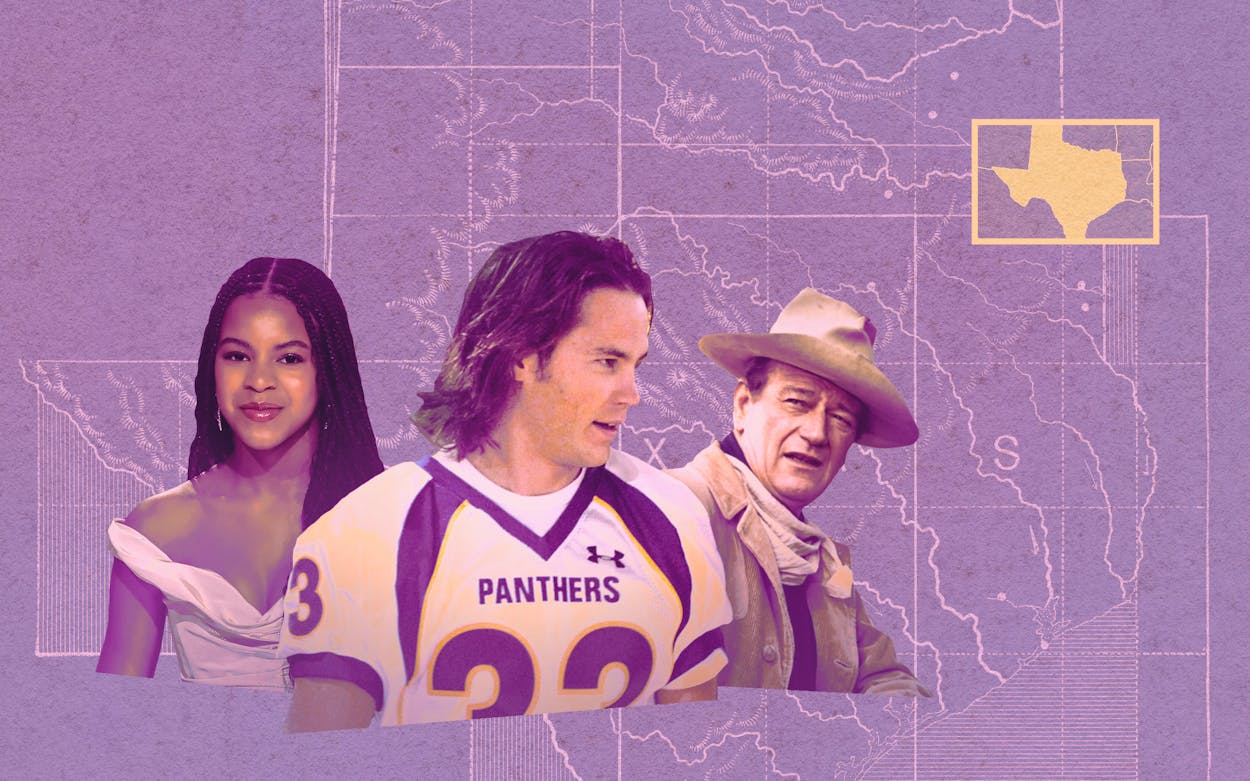When I think about what makes a Texan, I am reminded of the 1964 Supreme Court case Jacobellis v. Ohio, when Justice Potter Stewart tried to define pornography and wrote, “I know it when I see it.” As a staff writer at this state’s national magazine, where I have worked for a decade, determining who and what counts as “one of us” is part of my job. And I am well suited to the task: I was born and raised here, and all branches of my Texan family tree are several generations long.
My first sip of the proverbial Texas Kool-Aid was when I absorbed Big Red through my mother’s umbilical cord. I grew up believing we were special—chosen, even—and that there is no grocery store better than H-E-B, no mountain range more beautiful than the Chisos, no corny dog crispier than Fletcher’s, and no Matthew better than McConaughey (not even the one from the Bible). My Texan pride was only reaffirmed when I went to college in New York City, where I encountered classmates who considered three hours a long drive and thought it appropriate to call a hamburger cookout a “barbecue.”
Needless to say, I moved back home as quickly as I could. As much as I thought I already understood the Texas experience, the best part about having a job that requires me to think and learn about Texas all the time is that I am constantly identifying my numerous blind spots and filling them in. As time marches on, I fall more and more in love with this place, flawed though it may be. Texas is too hot and too dry, and these days it seems it’s not just our flora and fauna that can cause harm but also our government. I lament how much we argue about what sort of political beliefs “real” Texans are allowed to have. I grieve the decline of our rural communities and how it’s become so much harder to make a decent living raising cattle.
I never ever doubt my own Texanness, but I do spend a lot of time wondering what exactly makes someone one of us. There are two obvious parameters: place of birth and length of residence (most Texans fall into either the “born here” or “got here as quick as I could” categories). But things aren’t always so black and white. I know plenty of people who were born in Texas and got away from here as quickly as they could. I have a good friend who understands far West Texas infinitely more than I do, and she was born and raised in Queens. We are a culture as vast and varied as the 171,891,840 acres within our borders. In my eyes, Phoenicia Specialty Foods, an international market opened by Lebanese immigrants of Armenian descent in Houston in 1983, is as authentically Texan as Brady’s annual World Championship Barbecue Goat Cookoff. Identity matters, because as soon as you recognize something as undeniably Texan, well, then we all get to brag about it, if only just a little.
Take, for example, Canadian actor Taylor Kitsch. When his Tim Riggins character drunkenly delivered the line “Texas, forever,” in the pilot episode of Friday Night Lights, and raised his unlabeled beer bottle toward the sky, I’m sure my fellow Texan viewers raised our glasses along with him. The sentiment, and the love with which Riggins uttered it, gave me goosebumps. It may have been the first time I saw myself truly represented on screen. And I have no doubt that it helped my Yankee college friends—who also loved the show, because quite frankly everyone did—understand me a little better.
Kitsch was born and raised in British Columbia and didn’t spend any time in Texas until Friday Night Lights started filming in the Austin area in 2006. He lived in a South Austin apartment, and he would stay there for the next decade, years after the show’s 2011 finale, leaving it only because he finished building a 6,500-square-foot “dream home” on the banks of Lake Austin. “Texas forever,” he once said to a GQ reporter. “It looks like it’s going to be that way, too.” It wasn’t. Kitsch sold the Lake Austin property in 2021, saying the city had become too crowded, full of new people he couldn’t quite relate to. (I believe the alienation of Tim Riggins to be the final nail in Austin’s coffin.)
If we’re asking “is Taylor Kitsch a Texan?” the answer is, at face value, no. He wasn’t born here, he didn’t grow up here, and, all things considered, he didn’t live here that long. Even when he was living in Texas, he was living in Austin. The Capital City is absolutely an authentic Texas city—despite how many people accuse it of being otherwise—but sadly it is full of new transplants who are not required to give one hoot about the rest of the state in order to say they like living here.
I would argue that Kitsch was then, is now, and always will be one of us. The conviction with which he delivered his most famous line was so real, and at the risk of insulting Kitsch’s acting abilities, I don’t think he could have sold Tim Riggins as well as he did if he didn’t understand, in the depths of his soul, why a boy like Tim would never want to leave this place. Just like I don’t ever want to leave this place, and my parents didn’t ever want to leave this place, and their parents didn’t ever want to leave this place, and so on.
Which brings me back to the question of what makes a Texan a Texan. To quote Justice Stewart, “I shall not today attempt further to define the kinds of material I understand to be embraced within that shorthand description [“Texan”], and perhaps I could never succeed in intelligibly doing so. But I know it when I see it.”
Blue Ivy Carter? Wasn’t born here, doesn’t live here, and I can’t confirm when and how often she’s visited, but yes, she is absolutely 100 percent a Texan. Ethan Hawke was born in Austin but moved to New York City when he was a kid, and he mostly grew up in Princeton, New Jersey. Still, he comes from Abilene people, and he has always proudly embraced his Texas roots, so he counts as a Texan for life even though I think he’s lived in Brooklyn for decades. John Wayne—whose real name is Marion Robert Morrison, let us never forget—got to California from Iowa, and the whole persona of the Duke was probably developed in a Studio City press office. Still, the argument could be made that he is an honorary Texan, simply because of the characters he played, the way he carried himself, and how much influence the Duke had on the many Texans who loved his films. If you apply the “I know it when I see it” standard, you’d be hard-pressed to look at John Wayne and not see “Texan.”
Image credits: Carter: Kevin Winter/The Recording Academy via Getty; Kitsch: Bill Records/NBC/Courtesy Everett Collection; Wayne: Screen Archives/Getty; Maps: Getty
- More About:
- Film & TV
- Celebrity Bracket
- Taylor Kitsch
- John Wayne








